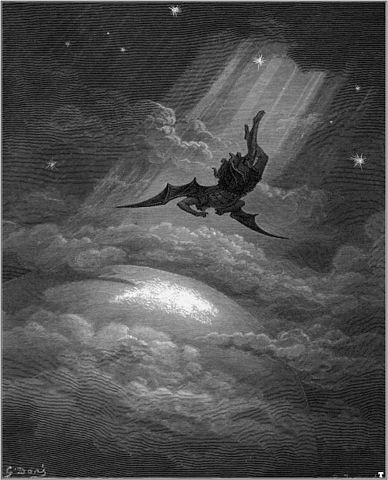In Mark’s gospel we meet Jesus as healer, as prophet, as priest, as sacrificial victim…and ultimately as risen Savior. In this reading, Mark introduces us to Jesus the Teacher. While Christ’s lessons are revolutionary, his teaching technique is tried and true. Jesus teaches primarily by example. His obedience to the will of the Father… his humility… his love for the least among us… are all actions that speak louder than words. But it is the words of Christ and their timeless lesson that is our focus this morning. Using the question and answer Socratic Method, the Teacher gives us a window into his divine nature and reveals his relationship with all who would follow him.
First, Jesus asks: How can Satan cast out Satan? A house divided against itself… will not stand. It’s a simple enough proposition, but think of the implications. In the first chapter of Mark, the unclean spirit recognizes Jesus and proclaims him: the Holy One of God. And the buzz begins: Who is this guy? In chapter two Jesus not only demonstrates his power over life and death, he claims mastery over good and evil, telling Lazarus: Your sins are forgiven. And only God can do that.
His listeners are rightly shocked. Some immediately seek to discredit him, questioning: If Jesus has power over good and evil, where does he get that power… from the good or from the evil? Then a scribe, who came down from Jerusalem just to challenge this rustic wonder worker, cuts right to the chase charging that: By the ruler of demons, he casts out demons.
With very simple but irrefutable argument, Jesus destroys this line of questioning. It is nonsense to suggest that Satan goes around driving out Satan. That power is God’s alone. Clearly Jesus has the power of God at his command. How else could he rout Satan from his hiding places? And while the declaration is yet to be made, the implication is surely there: Who else but God commands the power of God?
There is also a lesson here that should resonate with 21st Century Christians. Our society tells us that everything is relative. The concept of sin is so passé. The lines between good and evil are blurred. Our values are subject to situational vagaries. If it’s good for me, it’s good. But Jesus isn’t buying any of this smoke screen. He died for our sins, not for some vaguely defined differences of ethical opinion. In its essence, sin is a rejection of God in thought, word or deed. Jesus is the antidote for sin, the personification of God’s love, the instrument of his mercy.
In these gospel accounts of Christ’s early ministry, Jesus is using plain words and simple sentences to lay the foundation for the most revolutionary concept since Creation. Evil has met its match. God’s unconquerable love is revealed in the astounding identity of Jesus Christ, the Son of God, the Savior of the World.
In posing and answering his second question, Jesus tells us these lessons are far from academic. They are not to be hoarded by a privileged priesthood or to be the legacy of a single nation. The good news is to be shared with all of God’s family.
To make the case, Jesus asks: Who is my mother and my brothers? Then he immediately provides the answer: Whoever does the will of God is my brother and sister and mother. This is not the answer of a Nazarene carpenter whose kin are outside calling for him. This is the Son of God embracing us as his family. But that embrace comes with a condition that we do the will of God.
And what is that will? What is our family obligation? In Mark 12, Jesus gives us a concise answer: Love the Lord your God with all your heart and with all your soul… Love your neighbor as yourself. Baptism is the outward sign of our acceptance of God’s will, of our repentance for sin, of our infusion of grace.
In the context of this gospel, it also means we are family. In Yiddish to say: You are mishpocheh describes this relationship best. It tells us: Relax. You are totally accepted. You are one of us. To do the will of God is to be mishpocheh with Jesus.
We have a long way to go in Mark’s gospel. There are many lessons yet to learn. But with each question asked and answered, we have a much better idea of who Jesus is and what it means to follow him. We have been invited into brotherhood with Jesus and through him into the family of God. The dimensions and direction of God’s plan are coming into focus. With more questions to be asked and answered, the Teacher continually reveals himself. He prepares us for all of life’s lessons and he lovingly leads us to our graduation to glory.
The Reverend David Sellery, Episcopal Priest, Author, and Coach. Fr. Sellery presently serves as Priest-in-Charge, St. John’s Salisbury, CT. Fr. Sellery has excelled at using new media to increase outreach beyond the Church doors via his website, blog posts, and podcasts.
Image: “Paradise Lost 12” by Gustave Doré – Licensed under Public Domain via Wikimedia Commons

